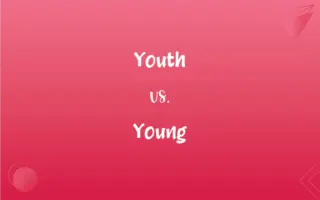Romanticism vs. Enlightenment: What's the Difference?
Edited by Janet White || By Harlon Moss || Updated on November 6, 2023
Romanticism is an artistic and intellectual movement emphasizing emotion and individualism; Enlightenment is an intellectual movement stressing reason and science.

Key Differences
Romanticism was an artistic, literary, and intellectual movement that originated in the late 18th century, emphasizing emotion, individualism, and nature. Enlightenment, on the other hand, was an intellectual movement of the 17th and 18th centuries, focusing on reason, science, and the power of human thought to understand and reform society.
While Romanticism cherished personal feeling and intuition, Enlightenment thinkers valued the scientific method and rationalism. The Romantics believed that subjective emotional experience was the path to truth, while the Enlightenment put its faith in objective empirical evidence and logical reasoning.
The Romantic era arose as a reaction to the Enlightenment's emphasis on logic and reason. Romanticism celebrated the beauty of the unpredictable and the imperfections of the natural world, which contrasted with the Enlightenment's quest for order and perfection through reason and knowledge.
Romantics prized the mysterious and the sublime, finding beauty in the awe-inspiring and the supernatural, whereas Enlightenment thinkers sought clarity, deeming knowledge and understanding as the avenues to freedom and progress.
In Romanticism, artists and writers sought to express a new level of emotional depth, often using nature as a metaphor for human feelings. Enlightenment thinkers, conversely, were more likely to advance ideas of progress and human development through education and political reform.
ADVERTISEMENT
Comparison Chart
Era
Late 18th to mid-19th century
17th to 18th century
Focus
Emotion, nature, individualism
Reason, science, progress
Perception of Nature
Majestic, awe-inspiring, spiritual
A subject to be understood and controlled
Art and Literature
Expressive, subjective, imaginative
Rational, instructive, often satirical
Philosophy
Intuition and feelings are keys to truth
Logic and empirical evidence lead to truth
ADVERTISEMENT
Romanticism and Enlightenment Definitions
Romanticism
A preference for the exotic and mysterious.
Romanticism infused her novels with a sense of wonder.
Enlightenment
A philosophical movement valuing scientific thought.
His work on natural rights was influenced by Enlightenment thinkers.
Romanticism
A movement valuing emotion and nature over reason.
Romanticism in literature often features an emphasis on emotional expression.
Enlightenment
An era promoting knowledge and reason.
The Enlightenment period is often called the Age of Reason.
Romanticism
A celebration of the past and medievalism.
The castle's architecture drew upon romanticism's revival of Gothic elements.
Enlightenment
An intellectual movement advocating for individual rights.
Enlightenment principles can be seen in the foundation of modern democracies.
Romanticism
An emphasis on individual experience.
His painting reflects romanticism's focus on personal spirituality.
Enlightenment
A cultural period favoring education and reform.
Enlightenment ideals spurred many societal reforms.
Romanticism
An artistic and philosophical stance stressing freedom and imagination.
Romanticism in music brought about longer, more expressive compositions.
Enlightenment
The act of gaining insight or understanding.
Her travel experiences led to an enlightenment about the world's diverse cultures.
Romanticism
Often Romanticism An artistic and intellectual movement originating in Europe in the late 1700s and characterized by a heightened interest in nature, emphasis on the individual's expression of emotion and imagination, departure from the attitudes and forms of classicism, and rebellion against established social rules and conventions.
Enlightenment
The act or a means of enlightening.
Romanticism
Romantic quality or spirit in thought, expression, or action.
Enlightenment
The state of being enlightened.
FAQs
What is Romanticism?
Romanticism is a cultural movement that values emotions, individualism, and nature.
When was the Enlightenment?
The Enlightenment was primarily in the 17th and 18th centuries.
What is Enlightenment?
Enlightenment is a historical period emphasizing reason, science, and human progress.
How did Romanticism view progress?
It was skeptical of industrial progress, fearing it might alienate humans from nature.
When did Romanticism occur?
Romanticism mainly took place from the late 18th to the mid-19th century.
Why did Romanticism arise?
Romanticism emerged as a reaction against the Enlightenment's focus on reason.
Were Enlightenment thinkers against religion?
Many supported deism or the idea that reason and natural law governed the universe.
Can Romanticism be found in today's culture?
Yes, its influence persists in contemporary art, literature, and philosophy.
Is Romanticism only about art?
No, it also encompasses literature, music, and philosophy.
How did the Enlightenment affect government?
It influenced the development of modern democratic and constitutional governments.
Was the Enlightenment optimistic about humanity's future?
Generally, yes, due to belief in continual progress.
What did Enlightenment thinkers believe?
They believed in the power of reason and scientific methods to advance society.
Did the Enlightenment contribute to the scientific revolution?
Yes, it was closely associated with advances in science and technology.
What genres did Romanticism influence?
It impacted poetry, novels, music, and visual arts.
Did Romanticism have a political impact?
Yes, it influenced movements for national liberation and individual rights.
Does Romanticism have a connection to nationalism?
Yes, it often celebrated national history and folklore.
How did the Enlightenment view the universe?
As orderly and governed by natural laws discoverable through reason.
What is the Enlightenment's legacy in education?
It encouraged the development of public education systems.
Did Romanticism value the supernatural?
Yes, it often embraced the supernatural and mystical.
Did the Enlightenment reject emotional aspects of life?
Not reject, but it certainly prioritized rational thought over emotion.
About Author
Written by
Harlon MossHarlon is a seasoned quality moderator and accomplished content writer for Difference Wiki. An alumnus of the prestigious University of California, he earned his degree in Computer Science. Leveraging his academic background, Harlon brings a meticulous and informed perspective to his work, ensuring content accuracy and excellence.
Edited by
Janet WhiteJanet White has been an esteemed writer and blogger for Difference Wiki. Holding a Master's degree in Science and Medical Journalism from the prestigious Boston University, she has consistently demonstrated her expertise and passion for her field. When she's not immersed in her work, Janet relishes her time exercising, delving into a good book, and cherishing moments with friends and family.







































































